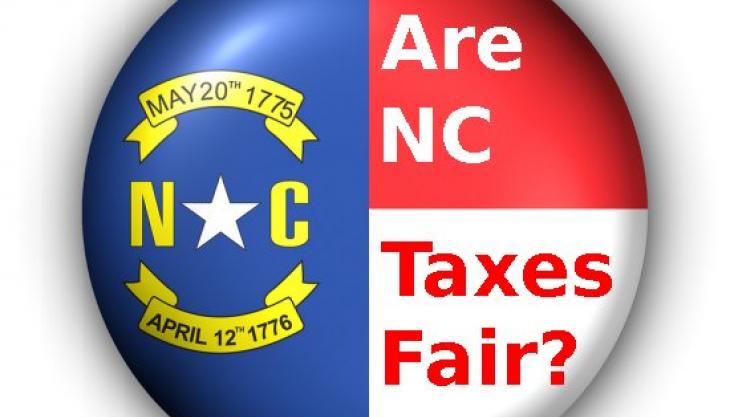New Study Shows in North Carolina, Rich Pay Less in Taxes Than Poor
Submitted by Rachel R on Tue, 02/10/2015 - 6:56pm

New study is critical of NC taxes
A brand new study by the Institute on Taxation and Economic Policy found that when state and local taxes are factored in: “The very poorest Americans on average pay double the state tax rate paid by the very richest Americans.” Doesn't quite seem fair, does it? In North Carolina, it's not quite double, but it's very close. Today, we'll take a look at what the ITEP study showed when it came to NC tax disparity.
The research covered non-elderly taxpayers – so we're looking at family income and taxes for those age 55 and under. Here are the findings:
- Those that earn less than $18,000 pay 9.2% on average
- Those that earn $18,000-$30,000 pay 9.1% on average
- Those that earn $30,000-$49,000 pay 9.2% on average
- Those that earn $49,000-$80,000 pay 8.8% on average
- Those that earn $80,000-$163,000 pay 7.8% on average
- Those that earn $163,000-$376,000 pay 6.8% on average
- Those that earn $376,000 and more pay 5.3% on average
What's interesting, in particular, is what makes up the percentages. These numbers represent the combination of sales and excise taxes; personal income taxes; property taxes; and then the total after federal deduction offset.
The lowest income earners paid nearly 500% more than the highest earners when it came to sales and excise taxes. This is likely caused by lower earners having to spend 100% (or more) of their income and being unable to save. The richest usually don't spend all their earnings and so the cumulative sales tax represents a much smaller percentage of their income.
Personal income taxes represent the smallest share of the lowest income earner's wages taking up less than 1% of their wages. In contrast, the top earners pay 4.4% in state income taxes. Property taxes also represent a huge burden on low-income earners, eating up 2.5% of their pay. Top earners pay just 1.4% of income toward property taxes. Even assuming that top earners have more costly properties (and perhaps multiple properties), the difference is staggering.
The Institute also evaluated North Carolina's tax policies and gave our state a thumbs up on its child tax credits and the fact that groceries are exempt from sales taxes. In the downside, the ITEP looked down on these aspects of NC taxation:
- Personal income tax rates are now flat (this was changed recently from a progressive rate)
- Local and state tax sales taxes are higher than many other states
- Local sales taxes do not exempt groceries
- Failure to provide refundable Earned Income Tax Credit
- Failure to give a property tax break to low-income earners
- Failure to make the Child Tax Credit refundable
- Made electricity fully taxable under state and local sales tax rates
As a note, what “refundable” means with the EITC and child tax credit is that if these taxes caused or increased a refund, that amount would be paid out to you. In our state, if they cause a refund, they are not paid out. Essentially, this means these credits can only reduce your taxes owed, not cause a refund. In contrast, EITC is refundable for federal tax purposes.
In short, recent changes to the North Carolina tax code for state, local and sales taxes are hitting the lowest income earners the hardest. But when comparing NC to other US states, we don't look so bad. The ITEP ranks us as the 31st worst state for unfair state and local tax policies. So the good news is, while NC taxes aren't great for lower income earners, the fact is, it could be worse.
If you're struggling to pay your bills, owe back taxes and are living paycheck to paycheck no matter how much you earn, you may need a debt intervention. Contact the law offices of John T Orcutt today for a free bankruptcy consultation at one of our NC locations in Raleigh, Fayetteville, Greensboro, Durham, Garner or Wilson. Call us at +1-833-627-0115 and be sure to ask about our zero down bankruptcy specials.
Debts Hurt! Got debt? Need help? Get started below!
Serving All of North Carolina
- Bankruptcy Attorneys Raleigh NC (North)
- Bankruptcy Attorney Fayetteville NC
- Bankruptcy Attorney Durham NC
- Bankruptcy Attorneys Wilson NC
- Bankruptcy Attorneys Greensboro NC
- Bankruptcy Attorneys Southport NC
- Bankruptcy Attorneys Wilmington NC
Bankruptcy Attorneys Raleigh NC (North)
6616 Six Forks Rd #203 Raleigh, NC 27615 North Carolina
Tel: (919) 847-9750

Bankruptcy Attorney Fayetteville NC
2711 Breezewood Ave Fayetteville, NC 28303 North Carolina
Tel: (910) 323-2972

Bankruptcy Attorney Durham NC
1738 Hillandale Rd Suite D Durham, NC 27705 North Carolina
Tel: (919) 286-1695


Bankruptcy Attorneys Greensboro NC
2100 W Cornwallis Dr. STE O Greensboro, NC 27408 North Carolina
Tel: (336) 542-5993

Bankruptcy Attorneys Southport NC
116 N Howe St. Suite A Southport, NC 28461 North Carolina
Tel: (910) 218-8682

Bankruptcy Attorneys Wilmington NC
116 N. Howe Street, Suite A Southport, NC 28461 North Carolina
Tel: (910) 447-2987
